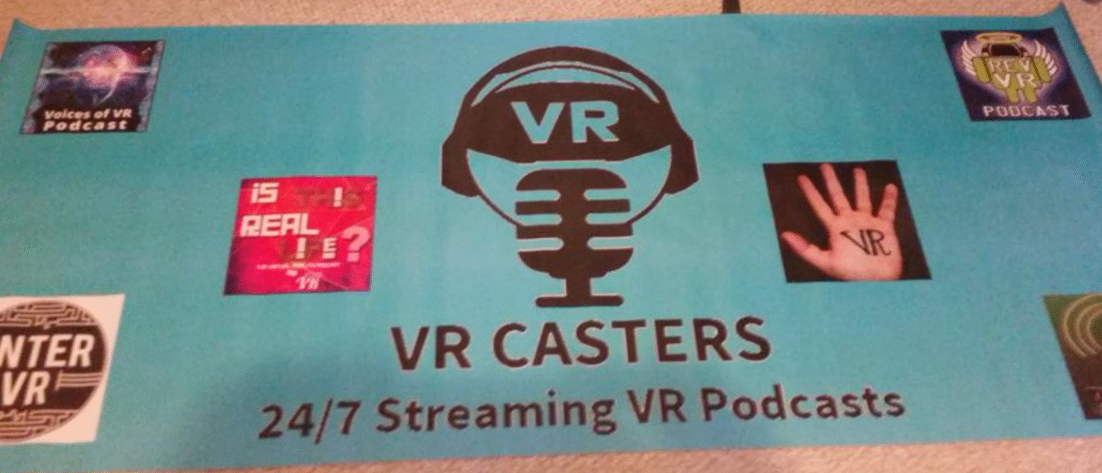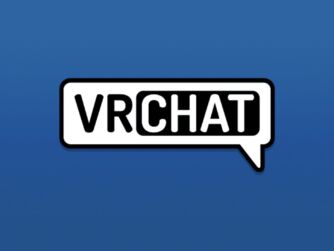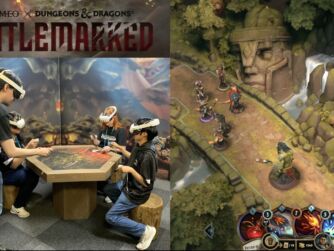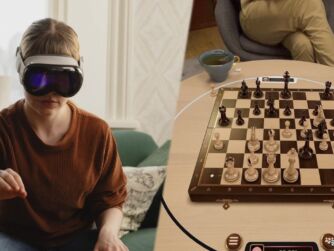 Brian Bullard is the co-host of the PodVR podcast as well as an independent VR game developer. He’s developed Moto Rider VR and the Oculus Game Jam game called Turret Defender.
Brian Bullard is the co-host of the PodVR podcast as well as an independent VR game developer. He’s developed Moto Rider VR and the Oculus Game Jam game called Turret Defender.
He’s known as “Bullardo” online, and he’s an active member of the VR community. He talks about some of the highlights over the past year including the growth of Silicon Valley Virtual Reality community, the PodVR podcast, developing games as an indie dev, and some of the other community events from VR livestreams, VRCasters.com, and hanging out in VR Chat.
Here’s the other topics that we cover in the interview:
- Starting PodVR podcast with Matt Carrell
- Livestreaming with VRCasters.com & discussing SVVRCon news
- Rapid development with the mobile VR game jam
- Evolution of the Turret Defender development process
- Learning to how to develop for mobile & the Gear VR
- Leaning towards doing desktop experiences for Oculus and the Vive
- Wants to explore more room-scale VR development with 2-handed interactions
- Convincing an independent game development studio to do VR once there’s a proven market
- Meeting people face-to-face from the VR social scene
- Growth of the SVVR community
- Compelling social VR experiences like developer talks
- Looking forward to the immersive VR games that come out, and looking forward to building his own games. Film, entertainment and live events.
Become a Patron! Support The Voices of VR Podcast Patreon
Theme music: “Fatality” by Tigoolio
Subscribe to the Voices of VR podcast.
Rough Transcript
[00:00:05.412] Kent Bye: The Voices of VR Podcast.
[00:00:11.938] Brian Bullard: My name is Brian Bullard. I do a podcast called PodVR with Matt Carroll. We've been doing that podcast a little over a year now. I'm also an independent game developer. I work full-time in game development doing 2D games, but on the side I'm doing VR games. I've got a couple on Oculus Share. I've got Motor Rider VR and then a new one from the Game Jam I've been working on. So just trying to build as many experiences as I can. Just riding the wave.
[00:00:40.099] Kent Bye: Nice, and so maybe talk a bit about, you know, PodVR, how that got started and, you know, where you see that going.
[00:00:45.424] Brian Bullard: Basically what happened was I found out about the Rift, I ordered a Rift, I got it, and then I wanted to connect with more people, so I found out about SVVR and connected with a person in my town, we're from Sacramento, Matt Carroll, who does stomps. So we we kind of decided to start ride-sharing and then from the ride shares I'd been a big podcast listener, but I didn't wasn't aware there was actual VR podcast so I just said why don't we just try it out and that's what happened and The first episode was horrible. The second episode was horrible. Eventually, it got better and met the community, kind of tight-knit group of the rest of the podcasters and development group. And here we are today, a year and a half later. It's just craziness.
[00:01:31.565] Kent Bye: And so what are you going to be doing here in the exhibit hall then?
[00:01:35.248] Brian Bullard: So we have a table for VR casters. We're going to be doing live streams out to the community. I'm probably showing our game jam entries, I would imagine. Kyle's got one. I've got one. Blair's got one, so he'll probably be moseying around the table. Olivier, JT, he might be showing some stuff. We're gonna just talk about everything that's going on here and all the different, I see a lot of different tables that I haven't heard about, so I'm interested to see what people are gonna be showing.
[00:02:04.123] Kent Bye: And so talk a bit about the Game Jam. What was your experience in doing that?
[00:02:08.345] Brian Bullard: The Game Jam? I mean, I work a full-time job, so it was a little difficult. And I decided, probably wrongly, to work on all by myself. So it was after work, weekends, and it was really difficult. I did the 2013 Game Jam. That game was nothing in the size of the one that I attempted this time. So I made it. You can play it end-to-end. I'll give it that. But it was a great experience. I love game jams. I do them from time to time, but they can be taxing on you. But it's good to get something out in such a rapid period of time. I think that's, you know, you can sit there and develop over something over six months, seven months, and it seems like it's never going to end. With a game jam, at least you have a real rapid deployment.
[00:02:54.663] Kent Bye: Yeah, that's the thing that I've noticed is that with those constraints, it really forces that creativity and a lot of either shortcuts or compromises, but in a really good way. It's in the sense that you actually get something done at the end of it and something you can play. And so maybe you talk a bit about things that you were focusing on and what you wanted to create.
[00:03:12.328] Brian Bullard: Yeah, essentially the game I created was at first a face shooter and then it kind of turned into a third person as you go through space. You're basically defending your ship, trying to escape by going through warp gates, ten warp gates. And at the end, if you can survive, you get a high score and I'm going to have like a leader boards and a difficulty level. I just started jotting stuff down on paper, kind of the idea and deciding whether I was going to be able to do it or not. So I had to take things off the stack as I knew that, I mean, at first it was, I wanted to do a lot and then I realized it wasn't going to be possible. You put in one feature and break two others, so that became an issue. That was kind of the development process. Eventually something came out at the end that was functional, but it's already changed. I'm planning on maybe going to the store with it, maybe another month or two development time.
[00:04:10.059] Kent Bye: And what did you learn from the process of developing for the Gear VR then?
[00:04:14.317] Brian Bullard: A lot of mobile development. I've been doing that for probably the last three to four months anyway, just trying to learn the gear. I would say just learning how to make everything kind of work smoothly and what the limitations are. That was a big learning experience and just being able to to work with the device itself. You know, if you sit there and work with a DK2, it's pretty easy to do things there, but with mobile, it's a little bit different. You have to hook up ADB and keep doing builds to see if what you did is even going to work. So you can't really do your game in a bubble and just use your DK2 and then think that you're going to put it in the gear and it's going to work. It doesn't work like that. So definitely learning how, how to run with the gear. Like that was the biggest, I think, takeaway from the game jam. I'm not sure if I'm a big fan of working on mobile. I like having no limit at what I can do and with mobile you're kind of limited at what you can develop.
[00:05:09.363] Kent Bye: Interesting. Yeah for me I see that the mobile is gonna be pretty huge in terms of the adoption and it's likely gonna be the first thing that actually launches and so in terms of creating something that may be viable or sustainable it seems like a lot of VR developers if they want to have something that's launching in say the fall that may be the first platform that has kind of a viable consumer market.
[00:05:30.217] Brian Bullard: Yeah, I mean, I agree with you there. I think it is going to be the first consumer. So having something on there is important, and that's why I'm kind of hitting that first. But my ultimate goal is to get the desktop experience, you know, that I've got some bigger projects that I've been wanting to do that I've been kind of prototyping and waiting for the Vive Oculus. So I'll have to decide which one I want to shoot for at first. But
[00:05:55.783] Kent Bye: Maybe both. So does that mean that you want to do something that's more room-scale and two-handed interactions? Or what were you kind of thinking? What can you not do on mobile that you want to do on these other systems?
[00:06:07.068] Brian Bullard: Yeah, I want to do more room-scale stuff. And, well, with mobile you're kind of hindered by what you can do graphically, I think. So I want to do something a little bit bigger. I did a lot of tests a year ago with the Hydra. doing kind of interaction type stuff. RPG is where I was going. I was building like a VR RPG. And it was way too early for me to be doing that a year and a half ago. So I had to kind of come back to the well, learn a little bit. then come back. So now I think I'm in a good spot now where that project is going to happen. So and I've met some people in between there and we've kind of been working on similar things. So I think my partnership might be happening. So that's what I want to do, I think.
[00:06:51.632] Kent Bye: And in terms of your day job at a game shop, are you using Unity, or is there any interest there of them potentially going from 2D into VR?
[00:06:59.858] Brian Bullard: Yeah, the problem with that is it is a 2D house. Right now, our games vary. It's a lot of Flash, but the last six months we've been Unity. So I've been doing development just solely there. I'm a systems engineer by trade, but I've kind of been moving around. Lately, I've been doing a lot of software development. So at some point I was hoping to get them into VR. I think they're kind of waiting for a market. So unless you can actually show them physical proof of monies, it's hard for an independent studio like them to just jump into it blindly. they know what I'm working on and I show them and so I've been kind of keeping them in the loop to tell them well you know it's not there yet but you know it's going to be there. So I think we'll be throwing some resources at it sometime soon.
[00:07:46.524] Kent Bye: And what are you most looking forward to here at the SVVRCon then?
[00:07:50.205] Brian Bullard: Just getting in contact with all the people that we talk to offline. I mean that's my favorite part to come to these is You get to meet all the people you've been talking to in VR chat or alt space or any number of the social experiences. That's the biggest piece, connecting, making those contacts, friends. I mean, they're all friends. But obviously seeing the things too, seeing new stuff. Just hanging out, seeing what people are gonna be dropping. And just being proud of Carl, what he brought this up from. Watching, I remember going to the SVVR meetups with 25 people. Now it's booked at 115, 120 people every single SVVR. It's really amazing what he's been able to accomplish with this.
[00:08:36.160] Kent Bye: And it seems like you've been spending a lot of time in social VR applications. And you live in Sacramento, which is not necessarily a VR hotspot of people that you can go hang out with face to face. And so maybe talk a bit about those experiences that you've had in social VR that have been really compelling for you.
[00:08:52.069] Brian Bullard: Yeah, I would say a lot of it, we've done mock TV shows. We've done contests. Some of those things are really, I think, really cool is where you can have a developer come on and talk virtually about what they're working in virtual reality, I think that's powerful. You know, after Bruce's streams, when he was doing streams, he's not doing so many of them today, but we would all gather in VRChat and just kind of go in a circle and just everyone introduces themselves. And you would always constantly get new people, and you'd hear about these things that these people are working on, which are amazing. And they're all from around the world. So I don't think I would ever met this variety of people in my entire life if it wasn't for VR, because I'm just in Sacramento.
[00:09:41.214] Kent Bye: And finally, what do you see as the ultimate potential for virtual reality and what it might be able to enable?
[00:09:47.338] Brian Bullard: For me, I'm looking for gaming, but I know it's going to impact way bigger than just gaming. I think there's industries that are going to completely just change because of it. For me, I've always wanted to build games, but my dream was always to build immersive games. And it's just now is that time where before I didn't have that skill set and I've kind of worked to get to that level. And yeah, it's like a perfect time. So I think for me it's games, but I mean, there's gonna be so many applications for this. Social is gonna be huge, medical education. I mean, the sky's the limit. I think film, live events, I think that's gonna be huge. I mean, there's so much to look forward to. But for me, I got to concentrate on one thing or I get too fragmented like I'm only one person So I got to concentrate on one thing definitely Great.
[00:10:39.703] Kent Bye: Well, thank you so much.
[00:10:40.524] Brian Bullard: Yeah. No, thank you for interviewing me It's nice nice to see you too because we've seen each other at events multiple times and I really love Your podcast and I enjoy like hearing all the different people that you interview
[00:10:52.060] Kent Bye: OK, awesome. Thanks. And thank you for listening. If you'd like to support the Voices of VR podcast, then please consider becoming a patron at patreon.com slash Voices of VR.




